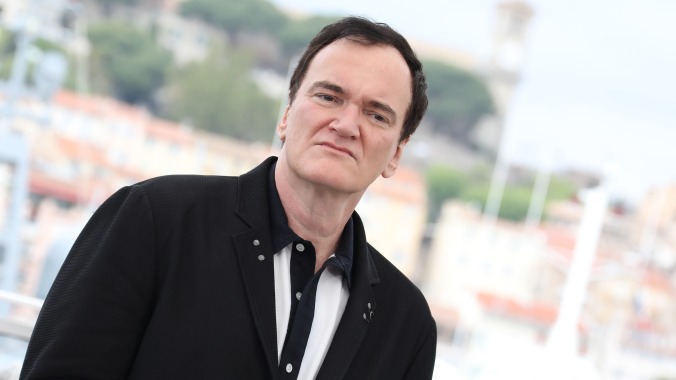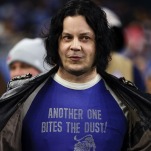It’s been an open question, ever since the film was first announced, how much Quentin Tarantino’s ninth picture, Once Upon A Time…In Hollywood, was actually “about” Sharon Tate, and her death at the hands of the Manson family in 1969. Tarantino made it clear early on that Tate (played by Margot Robbie) would be a character in the film, and initially went so far as to try to launch the film on the anniversary of her headline-making death. (That particular…tribute?…thankfully didn’t stick.) Even now, as critics react to the film’s premiere screening this week at Cannes, Tarantino’s insistence on spoiler decorum makes it unclear just how much Tate’s life and death overshadow his “hangout” movie about two semi-washed-up actors bumming around 1960s L.A., or the extent to which her murder is narratively central, or more about simply establishing a mood.
One thing is decidedly less ambiguous, though: Tarantino really doesn’t seem to want to be asked about his films’ relationships with their female characters anymore. Per Variety, the director fired back at a reporter asking about Robbie’s lack of dialogue in the movie—despite her prominent billing—with a clipped-at-best, “I reject your hypothesis.” Robbie was gracious enough to pick up the slack in a more diplomatic fashion, filling in for Tarantino by noting that, “I think the moments that I got onscreen gave an opportunity to honor Sharon and her lightness. I don’t think it was intended to delve deeper.” (Tarantino also mostly refused to engage with a question about the film’s “rage against women,” leaving co-star Brad Pitt to offer up the idea that Hollywood is actually “a rage against a loss of innocence” instead.)
This isn’t the first time Tarantino’s films have gotten off on the wrong (but also upsettingly, intimately filmed) foot with their treatment of women; some critics had a great deal of trouble with his most recent movie, The Hateful Eight, and its attitudes toward its sole (main) female character. And all of that went down before the dawn of the #MeToo movement, during which Tarantino both admitted that he knew “enough” of the details of his long-time benefactor Harvey Weinstein’s alleged actions against women that he should have said or done something to bring them to light or stop them, and was called out by his former friend and star Uma Thurman for endangering her safety on the set of Kill Bill Vol. 2.
Once Upon A Time is currently garnering strong reviews for Tarantino—including from our own A.A. Dowd, who called it, “funky, unusual, and sporadically sublime.” (He also noted that, while Robbie’s Tate is definitely a secondary character in the movie, she does provide some of its most moving, albeit largely wordless, moments.) The conversation surrounding the film—and whether its attitudes toward its female characters will draw censure or commendation from audiences—will inevitably change and evolve as more people have the chance to see it. In the meantime, it remains an open question whether Tarantino will be able to answer these sorts of critiques without coming off like a pissed-off middle school science teacher in the process.









![Rob Reiner's son booked for murder amid homicide investigation [Updated]](https://img.pastemagazine.com/wp-content/avuploads/2025/12/15131025/MixCollage-15-Dec-2025-01-10-PM-9121.jpg)

























![HBO teases new Euphoria, Larry David, and much more in 2026 sizzle reel [Updated]](https://img.pastemagazine.com/wp-content/avuploads/2025/12/12100344/MixCollage-12-Dec-2025-09-56-AM-9137.jpg)





